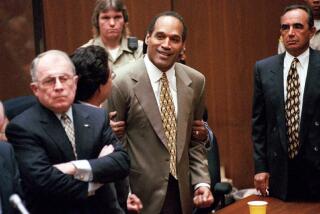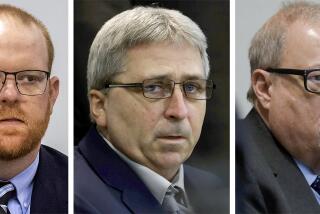Hazing death: Victim’s parents want Florida A&M; band dismantled
ATLANTA -- A day after 13 people were charged with hazing crimes in connection with the death of a Florida A&M; drum major, the parents of Robert Champion and their lawyer branded the charges as too slight, the investigation as less than thorough -- and they argued that the university had done too little to combat a culture of hazing.
They called on the university to dismantle its famous marching band.
“Initially, our theory was, ‘Listen, don’t stop the music, just stop the hazing,’” attorney Christopher Chestnut said in a news conference Thursday in downtown Atlanta, flanked by the parents, Pam Champion and Robert Champion Sr.
But now, Chestnut said, “We’ve got to stop it all. ... This is simply inexcusable. We have got to eradicate this culture.”
Champion, 26, died in November in Orlando, Fla., on a bus chartered for members of Florida A&M;’s vaunted marching band. A medical examiner’s report has determined that he died as a result of a brutal beating he received during a hazing incident.
Florida state attorney Lawson Lamar said Wednesday that the 11 of the 13 suspects would be charged with felony hazing, a crime that carries a six-year maximum sentence. The other two would be charged with misdemeanor hazing.
University officials, meanwhile, have placed the band on “indefinite suspension.”
Orange County Sheriff Jerry Demings, whose department handled the investigation, described it as an extensive one that included 48 interviews. On Thursday, however, Chestnut said that in the course of his own investigation -- part of a wrongful death civil suit he filed on behalf of the family -- his office collected numerous statements from students who said they were “coached” by alumni about what to say to criminal investigators.
Chestnut said there was also evidence that people on the bus the night Champion died were “caucusing on how to frame a story, such that basically those who were involved could get away with it.”
Chestnut called it a “calculated conspiracy,” though he appeared to have few details about who, if anyone, was directing it. His criticism extended to the the sheriff’s investigators, who, he said, “fumbled” their job by allowing the bus to leave the scene without sufficient collection of physical evidence, and by allowing the students to return to school where they could coordinate their stories.
Pam Champion added that no one had come to inspect her son’s cellphone or computer. Chestnut repeatedly described the death as a “murder,” but he said that prosecutors were stymied in bringing more serious charges because of the sloppy work of the sheriff’s department.
“Because there wasn’t an aggressive investigation initially, it’s been compromised,” he said. “So the state attorney has a very difficult task before him.”
A sheriff’s department spokeswoman declined to comment on the criticism. Avery McKnight, FAMU’s vice president for legal affairs, said the school “remains committed to the absolute eradication of hazing from all aspects of the University experience” and would deal with the marching band after reviewing the evidence in the criminal case and a Florida Department of Law Enforcement investigation of the band.
Champion’s death has rattled the world of historically black colleges and universities, where marching bands are an important symbol of school pride and a launching pad for African American success stories in music and beyond. Chestnut said that he had attended a FAMU band camp as a young man to study alto saxophone.
Chestnut, whose pending wrongful death lawsuit targets the bus company and its driver, said he planned to sue the school as well.
Pam Champion said that the band should be dismantled until the school could root out “the filth” responsible for the hazing culture.
“Seriously, they need to clean house,” she said.
ALSO:
Cabin full of frozen cows? Grab a saw and get to work
Bronx Zoo crash: Modern barriers installed on road where 7 died
Role of FBI informant is likely to be key in Cleveland bomb-plot case
More to Read
Start your day right
Sign up for Essential California for news, features and recommendations from the L.A. Times and beyond in your inbox six days a week.
You may occasionally receive promotional content from the Los Angeles Times.






